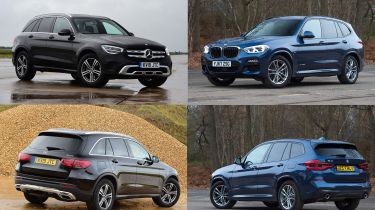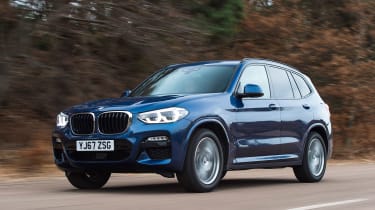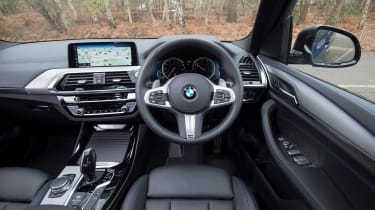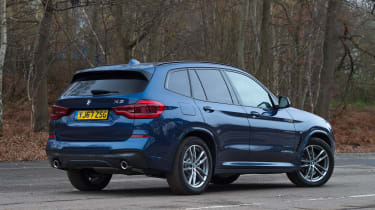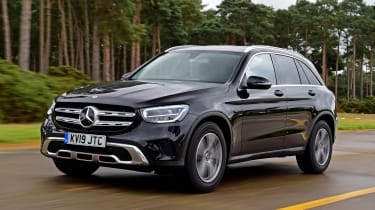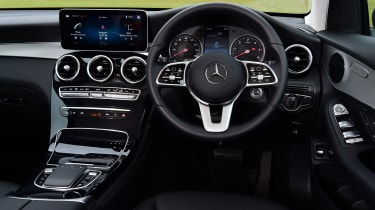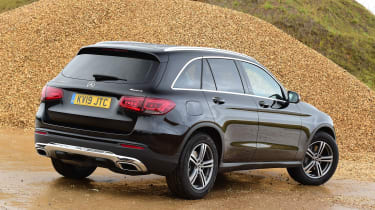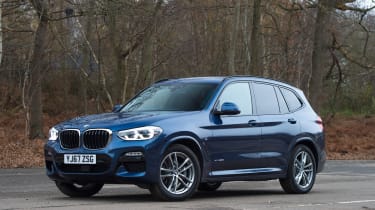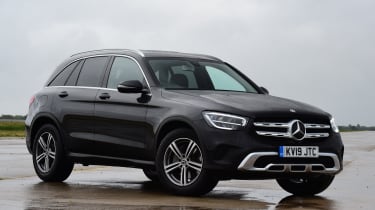BMW X3 vs Mercedes GLC
The revised Mercedes GLC is drawn against the class-leading BMW X3 in this premium SUV battle
For years Mercedes’ mid-size SUV model wasn’t available in the UK due to constraints of converting it to right-hand drive, but that changed in 2015 with the launch of the brand’s GLC.
Now, four years later, the car has rather fallen by the wayside under the onslaught of other premium off-roaders. The Alfa Romeo Stelvio, Audi Q5, BMW X3, Jaguar F-Pace, Land Rover Discovery Sport, Porsche Macan and Volvo XC60 all occupy this space, showing just how crowded this area of the market is.
However, it’s BMW that Mercedes has always fought closely, and the X3 is the car most closely aligned to the GLC – which is why we’ve pitted the two together here. This test will be fought on many fronts, so let us see how the Mercedes fares.
Head-to-head
| Model: | BMW X3 xDrive20d SE | Mercedes-Benz GLC 220 d Sport |
| Price: | £41,365 | £40,620 |
| Engine: | 2.0-litre 4cyl turbodiesel | 2.0-litre 4cyl turbodiesel |
| Power/torque: | 187bhp/400Nm | 191bhp/400Nm |
| Transmission: | Eight-speed automatic, four-wheel drive | Nine-speed automatic, four-wheel drive |
| 0-60mph/top speed: | 8.0 seconds/132mph | 8.2 seconds/134mph |
| Test economy: | 39.8mpg | 42.3mpg |
| CO2/tax | 133g/km/£465 | 137g/km/£465 |
| Options: | NA | Metallic paint (£685), trailer coupling with trailer stabilisation (£750) |
BMW X3
For: Strong balance of comfort, refinement, handling and performance, higher specification than GLC SportAgainst: Pricier than GLC, in-car technology isn’t quite as impressive as that in the latest BMWs
BMW’s CLAR architecture is now well known, but the X3 was one of the brand’s earlier cars to be launched on this platform. The underpinnings have gone on to be used in the 3 Series, for example, a car that rides and handles superbly.
Used - available now
However, the driving behaviour of SUVs such as these is often a compromise, because they have a higher stance and weigh a great deal. For example, the X3 is 1,750kg – albeit lighter than the 1,835kg Mercedes – but BMW has done its best to tune out any dynamic shortcomings, so the X3 steers and handles comparatively well.
The ride does have a slightly firmer edge than the Mercedes’, though, even if it deals with big bumps just as well. Despite this firmer sensation, the X3 is just as comfortable as the Mercedes. You get used to how it deals with imperfections in the road. Initially, it’s firmer and has less suspension travel, but the way it rounds the edges off inputs is still fairly plush. There’s less body movement than in the Mercedes, so you get thrown from side to side in the seat slightly less. That said, you pogo up and down a fraction more in the BMW.
The BMW is equal with the Mercedes for refinement, too; its 187bhp, 400Nm 2.0-litre four-cylinder turbodiesel drones if you rev it hard, but otherwise it’s smooth and fairly quiet.
There was very little difference in performance in our acceleration tests, with the X3 taking 8.0 seconds to hit 60mph from rest and the Mercedes 8.2 seconds. Performance is more than adequate in both cars. You’ll rarely need more, even if you might want a little extra oomph in just a few situations – pulling away from a roundabout being the main one. Otherwise, torque is good and acceleration from mid speeds is smooth.
The BMW’s eight-speed automatic gearbox certainly helps here, too, because it’s better than the Mercedes’ nine-speed unit. It’s quicker to lock up and transfer drive to the wheels, and while it’s as smooth shifting up and down the box, it does so more quickly, giving a more positive response.
In SE trim the BMW is certainly pricier than the Mercedes, but we think it warrants the extra cash (in combination with many other factors, as we’ll see). That’s because the materials feel a little more upmarket (especially on the transmission tunnel and centre console) and you get a good level of tech. This includes iDrive with sat-nav, LED headlights, heated seats, power tailgate, reversing camera, cruise and three-zone climate control, good safety tech and Apple CarPlay as standard, as well as real leather, not the man-made material in the GLC.
Tester's notes
• Infontainment: The graphics might not be as sharp as the Merc’s HD screen, but the iDrive set-up and touchscreen are easier to use• Transmission: Eight-speed automatic transmission in the BMW is smooth and quick to change• Trim quality: Everything you touch feels great, and the buttons and switches operate slickly
Mercedes GLC
For: New engine much more refined, improved infotainment installation, practicalAgainst: Still not as good to drive as X3 but no more comfortable, interior quality could be stronger
One of the biggest changes for this updated GLC is that Mercedes’ old 2.1-litre four-cylinder turbodiesel has finally been superseded. It’s been replaced by the newer, more frugal, more efficient and much more refined 2.0-litre unit that appeared first in the E-Class and has found its way into the C-Class saloon and other SUVs, such as the GLE.
The GLC’s engine produces 191bhp, which is 4bhp more than the X3, while there’s an identical 400Nm of torque to play with. Both rivals here are four-wheel drive, but the Mercedes uses a nine-speed automatic gearbox to the BMW’s eight-ratio unit.
The engine is at least as refined as the X3’s. It revs smoothly without too much diesel racket unless you really push it. The box isn’t as quickto shift as the X3’s – but then, in a car such as this, it arguably doesn’t need to be. What the Mercedes does deliver is smooth progress.
On test, it was 0.2 seconds slower from 0-60mph, taking 8.2 seconds. The difference in the transmissions meant the acceleration in the different gears obviously varied, but it was not by much. Going from 30-70mph up through the ratios, the Merc was again only 0.2 seconds slower than the BMW, at 8.3 seconds.
• Best family cars to buy right now
So performance is more than adequate and in touch with the BMW’s, while the Merc is comfortable, too. The suspension damping is languid. There’s more body movement than in its rival, but this does at least mean most undulations and ripples in the road are well contained. However, inputs from bigger ruts and potholes reverberate through the structure – especially if you hit them with the inside wheels when going round a corner.
When it comes to these cars’ dynamic behaviour it’s the comfort that matters more, but in other areas the Mercedes doesn’t nail the brief quiteas well. Despite an interior facelift, which incorporates new infotainment with a bigger screen and a digital dash on some models, the GLC’s basic layout hasn’t been altered too much. That means quality is alright but not quite on the X3’s level, while the design is just a bit more sedate. At least the interior is functional and spacious.
Sport trim is the bottom rung on the GLC ladder, but it does get a fair level of technology, with LED lights, active park assist with a reversing camera, heated seats, plus the new MBUX infotainment system with a 10.25-inch screen that features navigation. However, Sport trim doesn’t get the option of the Premium or Premium Plus packs, so you can’t add Apple CarPlay or Android Auto, for example. This is a shame.
Testers' notes
• Infotainment: 10.25-inch screen has sharp graphics and quick response• Transmission: Mercedes uses a nine-speed auto gearbox compared with the BMW’s eight-ratio unit• Quality: Dash features the usual premium feel you’d expect from a big Mercedes
Verdict
First place: BMW X3
The X3 is a well balanced machine, even in entry-level SE trim. As with the GLC Sport it isn’t our pick of the range, but it’s comfortable, drives better than the Mercedes and has extra standard kit. There’s more available to improve the spec, too. Running costs will be similar.
Second place: Mercedes GLC
It's an incredibly close-run contest, but in basic Sport trim the GLC just loses out. Its more limited kit doesn’t help, and while it’s comfortable, it’s not as good to drive as the X3, which mixes both attributes better. Still, the engine and infotainment tweaks are welcome, and we’d recommend the GLC.
